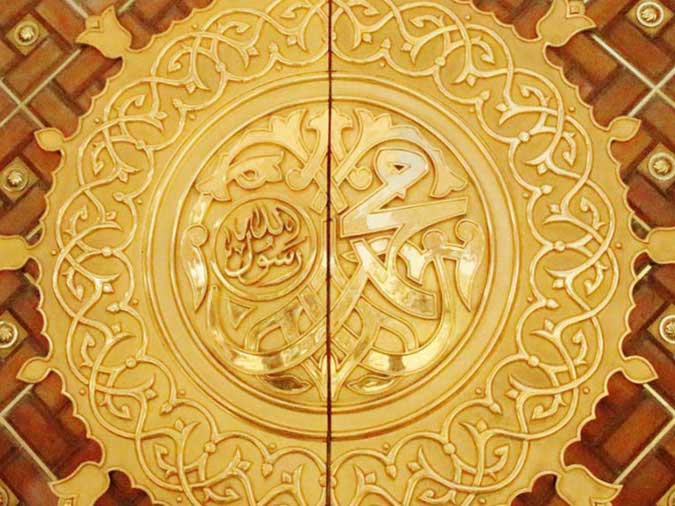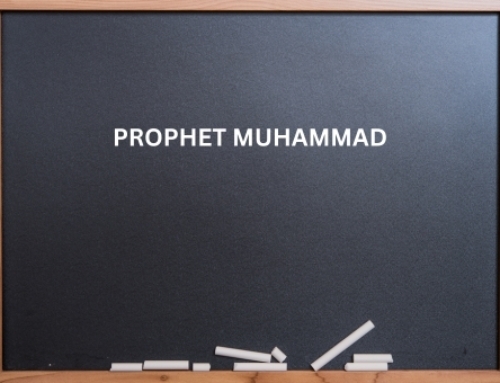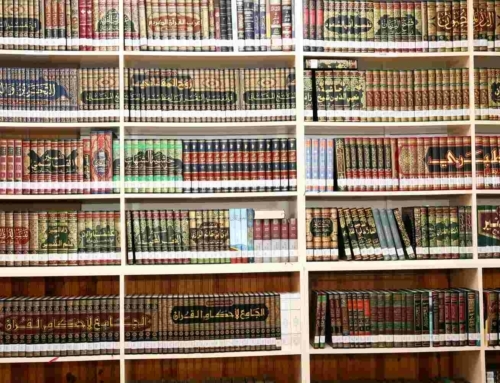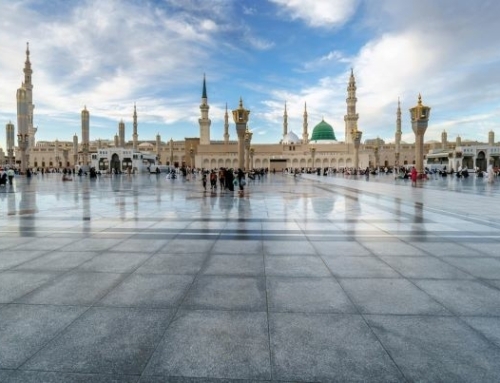Muhammad (peace be upon him): The Man Who Brought Islam to the World
In the Name of God, the Most Gracious, the Most Merciful
Muhammad (peace be upon him), the final prophet of Islam, is widely considered one of the most influential men in history. Today, nearly one fourth of the world’s population follows the message he delivered. Despite Muhammad (peace be upon him)’s lasting influence, many misconceptions continue to surround his persona and his teachings. This brief introduction of Muhammad (peace be upon him) summarizes his life and highlights what esteemed non-Muslim scholars have said about him. So, who was Muhammad (peace be upon him)?
“He was Caesar and Pope in one; but he was Pope without Pope’s pretensions, Caesar without the legions of Caesar: without a standing army, without a bodyguard, without a palace, without a fixed revenue; if ever any man had the right to say that he ruled by the right divine, it was Mohammed, for he had all the power without its instruments and without its supports. He cared not for the dressings of power. The simplicity of his private life was in keeping with his public life.” —Reginald Bosworth Smith
The Journey of Muhammad (peace be upon him): From Ordinary Man to Final Prophet
Muhammad (peace be upon him)’s life began in a seemingly conventional manner in the deserts of Arabia in the sixth century. When he turned 40 years old, God tasked him with prophethood and began revealing His final book, the Quran, to him. As a prophet, Muhammad (peace be upon him) called people to the divine teachings of Islam. He encouraged them to worship the One God and to uphold a morally upright life.
Studying Muhammad (peace be upon him)’s life is crucial to understanding his momentous journey from being an apparently ordinary human to fulfilling his destiny as the final prophet chosen by God (Allah in Arabic). It also helps one gain a deeper insight into the religion of Islam and the lives of Muslims.
Muhammad (peace be upon him): The Man
Muhammad (peace be upon him) was born in 570 C.E. in Mecca. He was orphaned at a young age; his father died before his birth, followed by his mother six years later. Muhammad (peace be upon him)’s grandfather, and then his uncle, cared for him for the remainder of his youth. As a result, no single figure molded Muhammad (peace be upon him)’s beliefs and outlook on life from an early age.
As a young boy, he worked as a shepherd. This was significant, as he noted much later, “All the prophets of God were shepherds.” Muhammad (peace be upon him) then adopted the premier Arab occupation of trading and was widely respected for his integrity and sincerity. However, despite his intelligence, he could not read or write, nor was he skilled in composing poetry, a hallmark of Arab society. Therefore, the claim that Muhammad (peace be upon him) authored the Quran is unfounded. To this effect, God declares in the Quran, “[Muhammad] does not speak from his own desire. The Quran is nothing less than a revelation that is sent to him” (53:3-4).
Prior to prophethood, Muhammad (peace be upon him) was greatly regarded for his superior character and exceptional manners, earning him the title of the ‘Truthful One.’ Meccans entrusted him with their possessions for safekeeping and he was often asked to mediate disputes as an impartial judge.
Muhammad’s Pre-prophetic Life: A Life of Meditation and Contemplation
At the same time, Muhammad (peace be upon him) detested the polytheistic Arab customs and did not participate in idolatry. He was also deeply bothered by the many social evils in Arabia, such as the ill treatment of women, widespread alcoholism, constant warfare and subjugation of the poor. He often escaped the atmosphere of Mecca to a cave outside the city, isolating himself for days at a time in meditation.
Although Muhammad(peace be upon him)’s pre-prophetic life was highly reputable, it does not indicate that he was poised to make any significant worldly impact. Yet, these life experiences and the development of his character were God’s way of preparing Muhammad (peace be upon him) for the monumental task ahead. (Learn more: Muhammad — What Manner of Man was He?)
Muhammad (peace be upon him): The Prophet
One night, in the year 610 C.E., God sent the angel Gabriel with revelation to Muhammad (peace be upon him). This was one of the most significant events in human history. It marked the beginning of his prophethood and transformed his life entirely. As the prophet of God receiving divine inspiration, all his endeavors henceforth were devoted to leading humanity back to the pure worship of God. He led an earnest life based on the most sublime values, initiating tremendous changes in Arabia and beyond.
Whereas earlier he removed himself from the social and spiritual corruption in Mecca, he now proactively worked to reform it. Muhammad (peace be upon him) called his fellow Meccans to cease their worship of idols and to affirm the Oneness of God; he also invited them to a life of righteousness and piety. He warned them of an afterlife where they will be held accountable for their earthly deeds and also gave joyful news of paradise to those who believed and lived a God-conscious life.
The Persecution of Muhammad (peace be upon him) and His Early Followers
Like previous prophets, Muhammad (peace be upon him)’s message was rejected by many of his people. They insisted on maintaining the religious and social customs of their ancestors. The elite mocked Muhammad (peace be upon him), accusing him of deceit and madness – the same man whom they freely trusted and honored before. Only a few people believed in him, particularly the poor and disadvantaged who were attracted to his message due to its emphasis on equality and justice.
Prophet Muhammad (peace be upon him) and his small group of followers endured persecution for 13 years in Mecca. Eventually, they were forced to leave Mecca and migrate to Medina, a city whose people eagerly welcomed them. Here, Muhammad (peace be upon him) established the very first Islamic society which eliminated the spiritual and social problems rampant in the Arabian Peninsula. Freedom of religion was instituted in Medina; women were honored and respected as equals; racial discrimination was practically eliminated; tribal warfare was replaced with united ties of brotherhood; usury and alcohol were completely forbidden.
Alphonse de Lamartine: Muhammad (peace be upon him) Was One of the Greatest Men in History
The French historian, Alphonse de Lamartine, has stated: “If greatness of purpose, smallness of means, and astounding results are the three criteria of human genius, who could dare to compare any great man in modern history with Muhammad?”
When comparing his life before and after becoming a messenger, it becomes clear that God enabled him to attain this stature and renown through his prophethood. By the end of his life in 622 C.E., the powerful teachings of Islam had overcome even its most ardent enemies. Convinced by the truth of Muhammad (peace be upon him)’s message and inspired by the purity of his character, the entire Arabian Peninsula embraced Islam.
Muhammad (peace be upon him): A Man of Great Integrity and Humility, Despite Allegations to the Contrary
Yet, some individuals have alleged that Muhammad (peace be upon him) was not a true messenger of God but a sham; this reflects a poor understanding of his teachings, personality and life achievements. Many non-Muslim intellectuals throughout history have attested to the impossibility of this view. The British historian, Dr. Montgomery Watt, addresses this perspective in his writing, “His readiness to undergo persecutions for his beliefs, the high moral character of the men who believed in him and looked up to him as leader, and the greatness of his ultimate achievement all argue his fundamental integrity. To suppose Muhammad an impostor raises more problems than it solves. Moreover, none of the great figures of history is so poorly appreciated in the West as Muhammad.”
In Life of Mohammed, the famous American intellectual, Washington Irving, wrote: “In his private dealings, he was just. He treated friends and strangers, the rich and poor, the powerful and weak, with equity, and was beloved by the common people for the affability with which he received them, and listened to their complaints… In the time of his greatest power he maintained the same simplicity of manners and appearance as in the days of his adversity… He was displeased if, on entering a room, any unusual testimonials of respect were shown to him.”
(Read more: Last Sermon of the Prophet Muhammad)
Muhammad (peace be upon him): The Legacy
In the century following Muhammad (peace be upon him)’s death, Islam expanded in all directions, absorbing the Persian and Byzantine Empires to the North, reaching as far as Spain in the West and extending its borders to include parts of India and China to the East. This rapid spread of Islam in such a short period of time has caused many to marvel at how a man with a simple message could produce such an astonishing impact on the world.
Mahatma Gandhi and Annie Besant on the Life of Muhammad (peace be upon him)
Mahatma Gandhi, a champion of peace in modern times, said about his experience of studying the life of Muhammad (peace be upon him), “I wanted to know the best of the life of one who holds today an undisputed sway over the hearts of millions of mankind… I became more than ever convinced that it was not the sword that won a place for Islam in those days in the scheme of life. It was the rigid simplicity, the utter self-effacement of the Prophet, the scrupulous regard for pledges, his intense devotion to his friends and followers, his intrepidity, his fearlessness, his absolute trust in God and in his own mission. These and not the sword carried everything before them and surmounted every obstacle.”
Similar admiration was expressed by British intellectual and women’s rights activist, Annie Besant:, “It is impossible for anyone who studies the life and character of the great Prophet of Arabia, who knows how he taught and how he lived, to feel anything but reverence for that mighty Prophet, one of the great messengers of the Supreme.”
Michael Hart: Muhammad (peace be upon him) Was the Most Influential Person in History
Muhammad (peace be upon him) was the final prophet in a long line of messengers sent by God which included, among others, Adam, Noah, Abraham, Moses and Jesus, peace be upon all of them. Like previous prophets, Muhammad (peace be upon him) called people towards belief in the One God and taught them to be just and merciful. His life and teachings have been meticulously documented by thousands of historical sources dating back to his companions.
Michael M. Hart, a Jewish-American historian, placed Muhammad (peace be upon him) first in his book, The 100: A Ranking of the Most Influential Persons in History. According to Hart, “He was the only man in history who was supremely successful on both the religious and secular levels… It is this unparalleled combination of secular and religious influence which I feel entitles Muhammad to be considered the most influential single figure in human history.”
Was Muhammad (peace be upon him) a Prophet or an Extraordinary Man?
Muhammad was indeed one of the most important men in human history; his impact on the world continues to be felt strongly today. Reflecting on his remarkable life and amazing accomplishments leads to an inevitable question: Was Muhammad (peace be upon him) simply an extraordinary person or did his greatness result from his being a genuine prophet of God?
Without a doubt, the answer to this question carries great implications. We encourage you to delve deeper into the study of Muhammad (peace be upon him)’s life and explore this potentially life-changing question yourself. (Read the biography of Prophet Muhammad.)
Note: “peace be upon him” next to Prophet Muhammad represents the invocation Muslims say with his name as a form of respect.
Suggested Reading:
Muhammad: His Life Based on the Earliest Sources by Martin Lings
In the Footsteps of the Prophet by Tariq Ramadan
Muhammad: Man and Prophet by Adil Salahi
877-Why-Islam presents Wisam Sharieff’s talk about the character of the Prophet Mohammad (peace be upon him). Was he the perfect example? His character was real, he was not hard-hearted, and the Quran mentions him as the Mercy to mankind. Watch this brief video to get some answers. This video is produced by 877-Why-Islam.
Got Questions?
We have Answers. Get in touch now.








